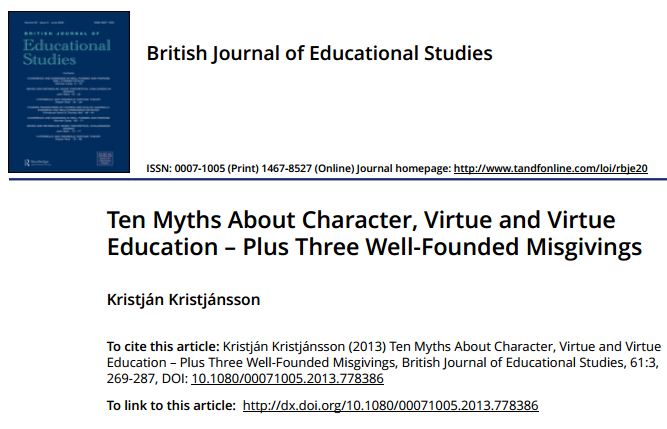Week 1 of the Future Learn course completed Kristjan Kristjansson’s “Ten Myths About Character, Virtue and Virtue Education – Plus Three Well-Founded Misgivings” is one of the key readings I challenge myself to tackle. I tackled it, it was tough. Unless you into reading the confused understanding of a novice ethicist – feel free to skip this post.
Back in 2013 he wrote that “the aim of cultivating (moral) character and virtue through virtue education in schools continues to be described as controversial.” Possibly, it is to the credit of the Jubilee Centre, this view is changing. Alternatively, it could be that society is in an even worse state of affairs in 2016, to the extent that we are now receptive. In for a penny, in for a pound.
Myth 1: ‘Character and Virtue are Unclear Notions’
It would be fair to say, without the direction of Ian Morris, I would have floundered for longer than I did. The frame of Moral, Intellectual, Civic, Performance virtues and the concept of phronesis (practical wisdom) is sufficient to challenge Myth 1. I think the issue lies as much with the common parlance of character, the unfamiliarity of virtue and misapplication of virtues as character eg Character and resilience being used interchangeably.
Myth 2: ‘Character and Virtue are Redundant Notions’
Kristjansson outlines the linguistic issues that besets the term “virtue” itself, virtues are ,at least, relatively stable; ‘compassion’, ‘integrity’, ‘fairness’, ‘tolerance’, ‘selflessness’, ‘discipline’, ‘dependability’,’ reliability’) (‘loyalty’, ‘trustworthiness’, ‘forgiveness’, ‘respect’, ‘determination’). Are we to make anything of the moral bias here?
Myth 3: ‘Character and Virtue are Old-fashioned Notions’
Kristjansson accepts these terms may not yet made their way down the irony tower stairwell, Aristotelian ethics is the hot virtue ethics topic. Who am I to argue?
Myth 4: ‘Character and Virtue are Essentially Religious Notions’
In our present-day multicultural contexts, ‘virtues’ make sense, irrespective of any religious context. As a teacher, I feel liberated to discuss virtues and not have to tread carefully as a result of my lack of religious knowledge.
Myth 5: ‘Character and Virtue are Paternalistic Notions’
Character Education is far form imposed, in my conversations with parents and carers it is expected. Nor is education the only pitcher of Character Education, nor the only teacher.
The charge then is that proscribed Character Education is paternalistic? Kristjansson’s point is Character Education is not proscribing what a virtuous life consists of.
That is my understanding of Myth 5.
Myth 6: ‘Education in Character and Virtue is Anti-democratic and Anti-intellectual’
Character Education is not indoctrination or conditioning.
Myth 7: ‘The Emphasis on Character and Virtue is Conservative’
Character Education is presented as disruptive rather than conservative.
Myth 8: ‘Character, Virtue and Virtue Education are Individualistic Notions’
“Virtue is seen as focusing excessively or exclusively on the capacities and achievements of individual students.” Of course, individual gains are important, however that is not the reason why school leaders and teachers are willing to invest so readily. I would expect that the goal is social change within the school.
Myth 9: ‘Character and Virtue are Essentially Relative Notions’
There is extensive empirical work in positive psychology on conceptions of virtues in different societies, religions and moral systems. In light of this work, positive psychologists claim that people are more or less the same wherever they go, and that the spheres of human life wherein our virtues and vices play out have remained essentially constant throughout history (Peterson and Seligman, 2004).
If I am honest, I didn’t understand Myth 9. Though I found that quote interesting.
I posted my lack of understanding over at the Future Learn. Professor Kristján Kristjánsson replied himself.
Relative could mean “relative to a moral theory”. However, one need not be a virtue ethicist to believe in the moral value of good character. Utilitarian’s do also, for example. Or it could mean “culture-relative”.
So then I had to learn about Utilitarian’s. Utilitarianism is a theory in normative ethics holding that the best moral action is the one that maximizes utility / well-being. Now I am beginning to understand. Kristjánsson goes on to explain.
That is an empirical thesis which has been refuted over and over again. Not only are more or less the same core virtues touted in all human societies, some seem to be logically necessary for there to be a society at all, for example the virtue of reliability.
Myth 10: ‘Character and Virtue are Entirely Situation Specific’
It is now agreed that behaviour is a function both of character and situations. Second virtue education not only helps students develop virtuous traits it also to teacher students how to “steer clear of perilous situations.”
Well-founded misgivings
Education lurches from one term to another. Second, virtue education needs to be interdisciplinary: to integrate insights from philosophy, psychology and education.
There is a need for clear empirical methodology. The lack scientific credibility inhibits wider adoption.
Do we know what works? Are proxy measures sufficient (reduction in misdemeanours?)
[qr_code_display]



I’m a big believer in developing the social emotional well-being of our further generations.. I currently use a character education programme with my year 8 nurture students with various needs and they are not only growing as a group but also as a person within the wider community.
I am also trying to use some the language and ideas of transactional analysis and a great book that I could read over and over again is ‘Counselling for Toads’ by Robert de Board.
‘First they nursed him. Then they encouraged him. Then they told him to pull himself together…Finally, Badger could stand it no longer. “Now look here Toad, this can go on no longer,” he said sternly. There is only one thing left. You must have counselling!’